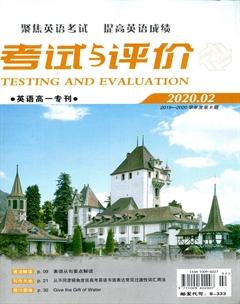主語(yǔ)從句用法“大揭秘”
孫玉忠
主語(yǔ)從句是中學(xué)階段的重點(diǎn)語(yǔ)法項(xiàng)目,也是高考的熱點(diǎn)之一。主語(yǔ)從句在復(fù)合句中作主句的主語(yǔ)。其關(guān)系代詞和關(guān)系副詞有:that, whether, who, which, when, where, how, why等。
一、連接詞的選擇
按連接詞的用法特點(diǎn),我們可以把主語(yǔ)從句分為三類:
1. 以that引導(dǎo)的主語(yǔ)從句,盡管that沒(méi)有實(shí)際意義,但也不能省略。如:
That she was wrong is obvious. 她錯(cuò)了,這是很明顯的。
That we shall be late is certain. 我們將要遲到,這是顯而易見的。
【注意】 有時(shí)可用形式主語(yǔ) it 代替主語(yǔ)從句,即將it 放在句首,把主語(yǔ)從句放在句末,以避免句子頭重腳輕。如:
It is doubtful whether he is coming. 他是否要來(lái),是令人懷疑的。
It is hoped that the blacks will have equal rights. 我們都希望黑人能享有平等的權(quán)利。
2. whether 引導(dǎo)主語(yǔ)從句 ,不充當(dāng)從句的任何成分。以whether(是否)引導(dǎo)的主語(yǔ)從句,不能用if來(lái)代替。如:
Whether they'll set out at 7:00 tomorrow morning is unknown. 明天他們是否要在7點(diǎn)出發(fā),這是不知道的。
Whether she is coming or not doesn't matter too much. 她來(lái)不來(lái)都無(wú)關(guān)緊要。
【注意】 引導(dǎo)主語(yǔ)從句時(shí)只有用it作形式主語(yǔ)時(shí),whether和if都能引導(dǎo)主語(yǔ)從句。如:
It hasn't been decided whether / if we shall attend the meeting. 我們是否去參加會(huì)議還沒(méi)有決定下來(lái)。
3. who, which, what, why, when, how等引導(dǎo)主語(yǔ)從句
這類連接詞也具有雙重作用,翻譯時(shí)這些連接詞與其作疑問(wèn)詞的意思相當(dāng)。有時(shí)也可用作形式主語(yǔ)it。如:
Which football team will win the match is unknown. 哪一個(gè)足球隊(duì)會(huì)贏得比賽,還不清楚。
What we need now is more rest. 我們現(xiàn)在所需要的是更多的休息。
How the prisoner escaped is a completely wrong. 囚犯如何逃走的是一個(gè)絕對(duì)的錯(cuò)誤。
【注意】
1. 如果帶主語(yǔ)從句的句子是疑問(wèn)句或感嘆句時(shí),則必須用形式主語(yǔ)it。如:
Is it true that the scientist will give us a talk next week? 那位科學(xué)家下星期要給我們作報(bào)告是真的嗎?
Has it been announced that when the planes are to take off? 已經(jīng)宣布飛機(jī)何時(shí)要起飛了嗎?
How strange it is that the children are so quiet! 真奇怪,這些孩子那么地安靜!
2. what, whatever, whoever 等引導(dǎo)的主語(yǔ)從句,一般不用 it 作形式主語(yǔ)。如:
What he wants is a book. 他所想要的就是一本書。
Whoever leaves the room last should close the door. 無(wú)論是誰(shuí)最后一個(gè)離開房間都要鎖好門。
二、謂語(yǔ)動(dòng)詞的數(shù)
主語(yǔ)從句作主語(yǔ),謂語(yǔ)動(dòng)詞一般用單數(shù);但 what 引導(dǎo)的從句作主語(yǔ),代表復(fù)數(shù)概念(常可從表語(yǔ)上看出)時(shí),謂語(yǔ)動(dòng)詞則常用復(fù)數(shù)形式。如:
What we need is water. 我們所需要的是水。
What the boy wants are those red apples. 那個(gè)男孩想要的是那些紅蘋果。
三、主語(yǔ)從句中的語(yǔ)氣
在下列情形中,主語(yǔ)從句的謂語(yǔ)動(dòng)詞用“should + 動(dòng)詞原形”。
1. It is suggested / requested / proposed / desired / required ?that... ,主語(yǔ)從句中的謂語(yǔ)動(dòng)詞也要用虛擬語(yǔ)氣。如:
It has been decided that the meeting (should) be put off. 已經(jīng)決定推遲這個(gè)會(huì)議。
It is suggested that we (should) take the bus. 有人建議我們乘公共汽車。
2. 在用it作形式主語(yǔ)的時(shí)候,如果作表語(yǔ)的形容詞為necessary, important, impossible, strange, natural, advisable, desirable, urgent, essential等時(shí),即“It + be + 形容詞 + 主語(yǔ)從句”,主語(yǔ)從句中的謂語(yǔ)動(dòng)詞要用虛擬語(yǔ)氣,也就是“should+do”,should可以省略。如:
It is necessary that the problem (should) be discussed at once. 立刻討論這個(gè)問(wèn)題很有必要。
It is strange that he (should) have so many friends. 太奇怪了,他有那么多的朋友。
四、whoever, whatever, whichever引導(dǎo)主語(yǔ)從句
whoever, whatever, whichever可引導(dǎo)主語(yǔ)從句。Whoever = anyone who; whatever = anything what; whichever = anything which。whatever和 whichever還可用作連接形容詞。如:
Whoever breaks the law should be punished. 無(wú)論是誰(shuí)觸犯了法律,都應(yīng)受到懲罰。
Whatever was said here should be kept a secret. 這里說(shuō)的話都應(yīng)當(dāng)保密。
Whichever book she bought would be paid for. 無(wú)論她買了哪一本書都要付款。
五、強(qiáng)調(diào)句中的主語(yǔ)從句
為了達(dá)到某種表達(dá)效果,主語(yǔ)從句有時(shí)可用在強(qiáng)調(diào)句中。如:
It was what she said that made all the people present laugh. 就是她說(shuō)的內(nèi)容讓在場(chǎng)的人都大笑起來(lái)。
【考點(diǎn)精練】
I. 單句語(yǔ)法填空。
1. It suddenly occurred to him ___ he had left his keys in the office.
2. The limits of a person's intelligence, generally speaking, are fixed at birth, but ___ he reaches these limits will depend on his environment.
3. It doesn't matter ___ you turn right or left at the crossing—both roads lead to the park.
4. It is by no means clear ___ the president can do to end the strike.
5. Most of what has been said about the Smiths ___ (be) also true of the Johnsons.
6. It is required in the regulations that you
___ (tell) other people the password of your e-mail account.
7. As many five courses are provided, and you are free to choose ___ suits you best.
II. 從方框中選擇合適的詞填空(方框中的單詞數(shù)量可能多, 有的詞也許不是用一次)。
what, who, that, whether, because, if, where, when, why, how, whomever, whatever, whichever, ?whoever
1. ___ you don't like him is none of my business.
2. After Yang Liwei succeeded in circling the earth, ___ our astronauts desire to do is walk in space.
3. ___ leaves the room last ought to turn off the lights.
4. ___ he can finish his task on time is of great importance.
5. ___ they will solve the serious problem has not been decided.
6. ___ he did that wasn't quite clear.
7. ___ he said at the meeting astonished everybody present.
8. It is a fact ___ the English is being accepted as international language.
9. ___ the old man comes from is still a puzzle.
10. It won't make too much difference___ he will join us.
- 考試與評(píng)價(jià)·高一版的其它文章
- 參考答案
- 必修3第3—4單元階段檢測(cè)題
- 必修3第4單元同步檢測(cè)題
- 必修3第3單元同步檢測(cè)題
- 完形填空二則
- 閱讀理解兩篇

